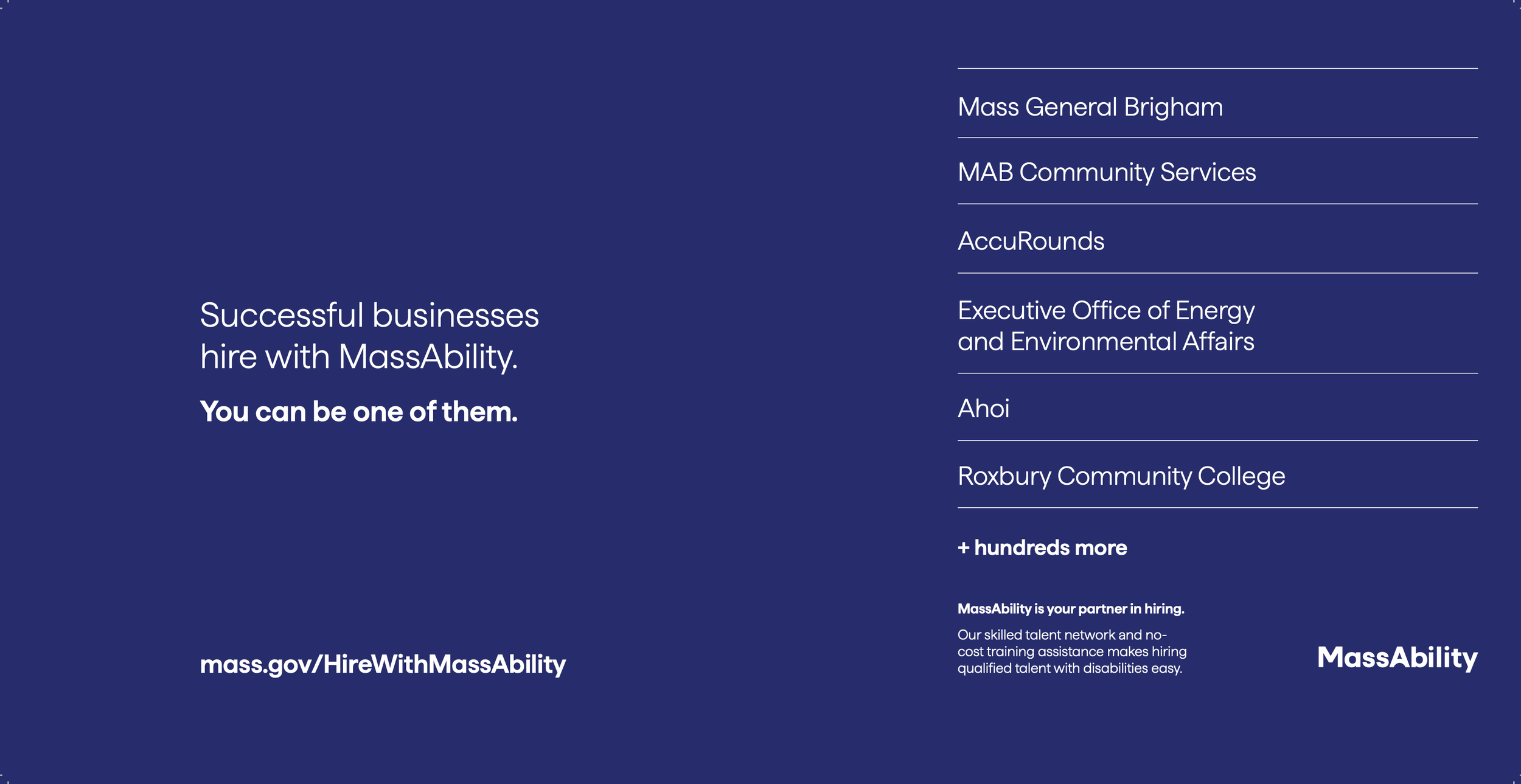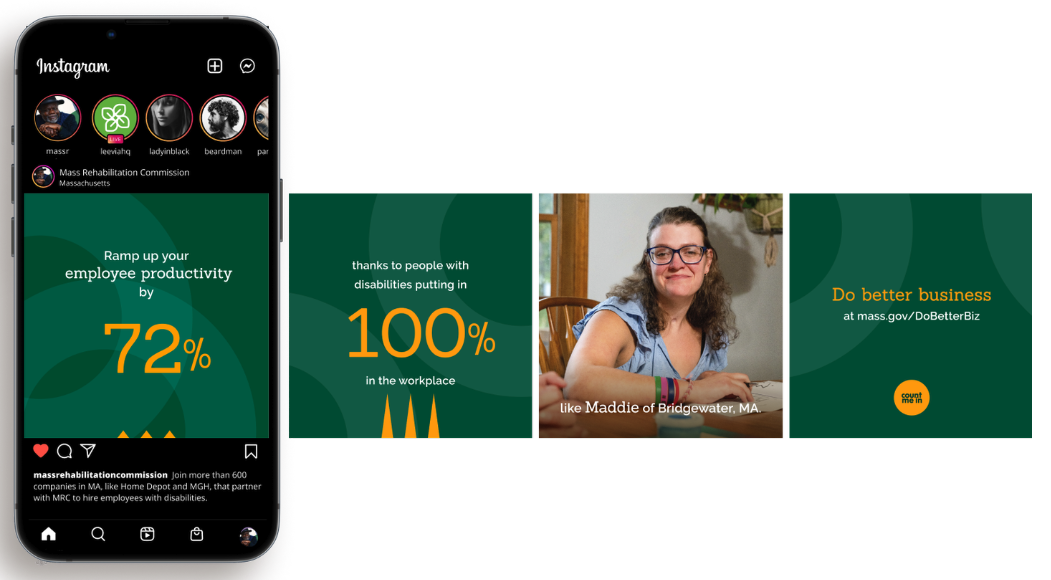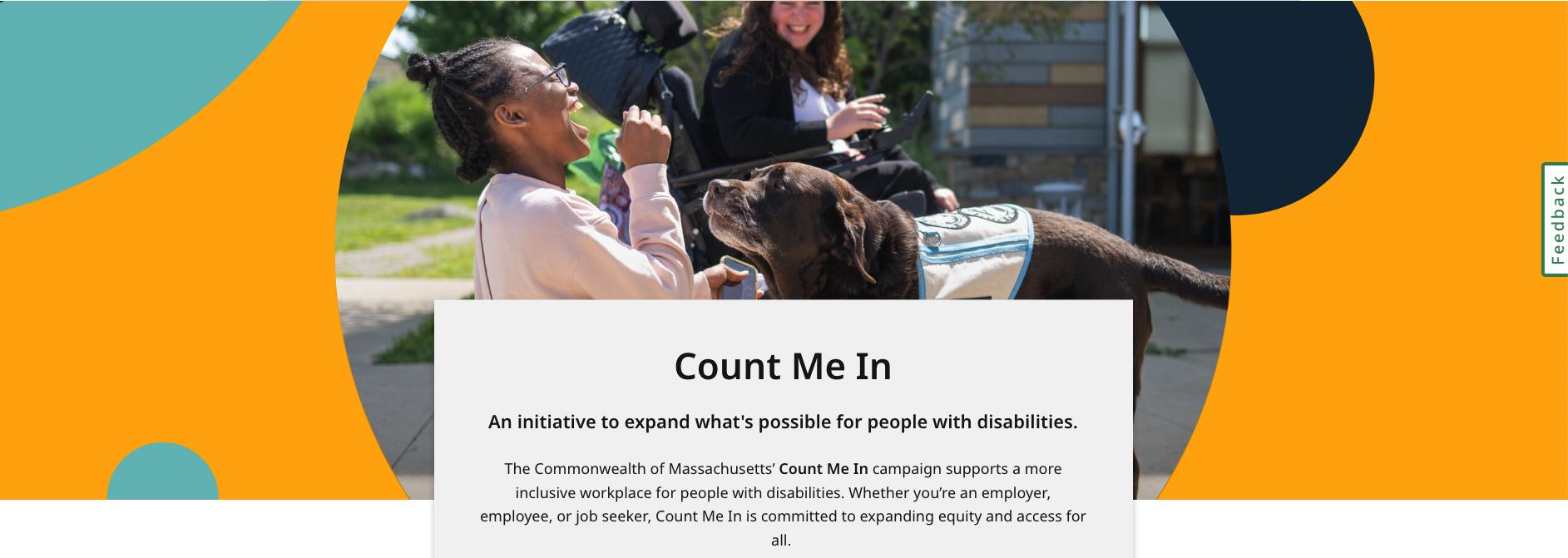Do Better Business:
A Multi-Campaign Effort to De-stigmatize Disability Employment
The Client: MassAbility (formerly the Massachusetts Rehabilitation Commission)
The Problem
The client engaged us to create a campaign for Disability Employment Month to increase awareness of and engagement with the MA Disability Employment Tax Credit (DETC) — both on the part of employers applying for the tax credit, and employees getting certified.
Through our research, we uncovered four insights:
While the DETC is a program that requires action from both employers and candidates, employers need to lead the way
There is a lack of awareness around the DETC program, there is a deeper issue to be addressed around stigma and disability employment at large.
The societal stigma around disabilities that stem from misconceptions and a lack of knowledge, do impact those making hiring decisions.
On the flip side, there are several advantages to hiring individuals with disabilities — not only for the disability community, but for business overall.
There are many employers who already hire and recruit people with disabilities, but are not taking advantage of the tax credit.
In practice, the DETC relies on employee self-disclosure...but those with disabilities don’t trust that it’s safe to do so. Because most employers aren’t hiring candidates with disabilities because they assume that the ‘risks’ outweighs the benefits. And they don’t understand the value of disability employment overall. As much as they convince themselves that they’re unbiased, hiring decisions are often intensely subjective, and that sense of apprehension can shift the fate of a candidate, keep people from disclosing their disability, and discourage active recruitment within the community.
In order to increase participation with the DETC, we needed to first change recruitment and hiring patterns. To do that, we needed to focus on changing employer’s minds and hearts: to see value in disability employment.
The Approach
We proposed a bilateral effort: starting with a public awareness campaign to tackle stigma and elevate perceived value of disability employment among employer who have yet to do their part in hiring individuals with disabilities.
Do Your Part
Change Goal: Destigmatize disability employment and make it more likely that employers recruit, hire, and support people with disabilities.
Marketing Objective: Raise awareness of the value –both for the employer and for the community – that people with disabilities create every day. Counter bias and stigma; and create a sense of shared responsibility
The Audience Experience: Hiring someone with a disability is not going out on a limb. It’s being part of a community of employers, officials, and advocates who are committed to making MA a better place to live and work for everyone.
Current Perspective: I may follow the letter of the law, but apprehension and bias makes me less likely to recruit and/or hire people with disabilities. And our workplace culture makes it less likely that people will disclose a hidden disability.
Desired Perspective: I feel supported – by my peers, by society, and by MassAbility – in my decision to seek out and hire people with disabilities. And that support helps to create a workplace culture that is safe and inclusive for everyone.
Proof Points:
Every day, more employers are successfully bringing people with disabilities into their teams.
MassAbility is there to support both employees and employers to ensure that both parties get the most value out of their relationship.
As an employer, it is likely that you already habe people with disabilities on your payroll—whether they have disclosed or not. People who are making significant contributions to your bottom line.
Creating an inclusive culture for people with disabilities gives you access to an essential talent pool—it could very well be a competitive advantage.
Key Messages:
As an employer, Doing Your Part means taking action to create a welcoming and inclusive workplace for people with disabilities.
Talk to your peers. Learn the facts. And let everyone know that you’re making recruiting and hiring people with disabilities a priority.
It’s time to recognize and celebrate everyone for what they can do, rather than what they can’t.
When it comes to opportunity, full participation, and economic self-sufficiency for people with disabilities, we’re all in this together.
Breaking down barriers for people with disabilities is everyone’s responsibility
With this strategy, MassAbility launched a series of employer focused campaigns: Count Me In, Do Better Business, Not A Chance, and Successful Businesses Hire with MassAbility.
While the original campaign focused more on the value and importance of DEI, and disability employment being the good / right thing to do, the change in political climate under the Trump administration had us rethink the angle. For the following campaigns, instead of focusing on the moral value of disability employment, we leaned harder into the business value proposition.
With this public awareness campaign in market, we proposed a secondary internal messaging campaign to help increase awareness of and participation in the DETC.
Our research showed that the employers who already recruit and hire candidates with disabilities aren’t inherently looking for a financial incentive — so many are unaware of the tax credit opportunities available to them. When they do find out about it, the thought of a tedious process and paperwork is enough to keep them from applying. And while these employers recognize the value their employees with disabilities bring to the table, and are already doing their part in boosting disability employment, many aren’t sharing their experiences with others, or encouraging others in their industry to do the same.
Get The Credit
Change Goal: Make it easier for employers and employees to engage with the certification system.
Marketing Objective: Give people tools to engage the DETC; drive engagement with MRC; and build a base of disability employment ambassadors
The Audience Experience: I’m already playing a key part in expanding the disability employment sector, so I might as well get the credit for it. I deserve to be recognized for my work in moving the needle; and my own success story could be the tipping point for those still struggling with risk versus reward.
Current State: Employers that recognize the value of disability employment continue to build out their workforce without realizing the opportunities available to them to receive financial support. They operate in their small sphere of disability awareness with others like them; and don’t publicize the diversity of their workforce
Desired State: Employers feel supported – by their peers, by society, by MRC and the federal government –and proud of their commitment to recruiting and hiring people with disabilities. There is a shared awareness across industries of who has made this commitment; creating a movement to foster workplace cultures that are safe and inclusive for everyone
Proof Points:
For small and/or new businesses, the credit goes a long way, including into building infrastructure to better support disability recruitment + employment.
MassAbility is there to support both employees and employers to ensure that both parties get the most value out of their relationship.
Recognizing disability in the work place is how we help to change workplace culture and show that peopel with disabilities are essential to our success.
Testimonials of impact and success will go a long way in building incentive.
Key Messages:
As an employer that’s doing your part, you deserve to get the credit. You’re making a positive difference and that’s something worth celebrating
Talk to your peers. Share the facts. And let everyone know that you’re making recruiting and hiring people with disabilities a priority.
Step forward, speak out, share your stories of success. Do your part to build a workplace culture that welcomes everyone
Whatever challenges you are facing, always remember: you’re not alone. MassAbility is here to support you at every step of your career.
If you have yet to disclose your disability in your workplace, think about it. It’s how we help to change workplace culture and show that people with disabilities are essential to our success.
While this campaign has yet to come to life, the lesson learned here was that before we could tackle promoting the tax credit, we needed to break down barriers and de-stigmatize the topic of disability employment first.
Agency: Argus






